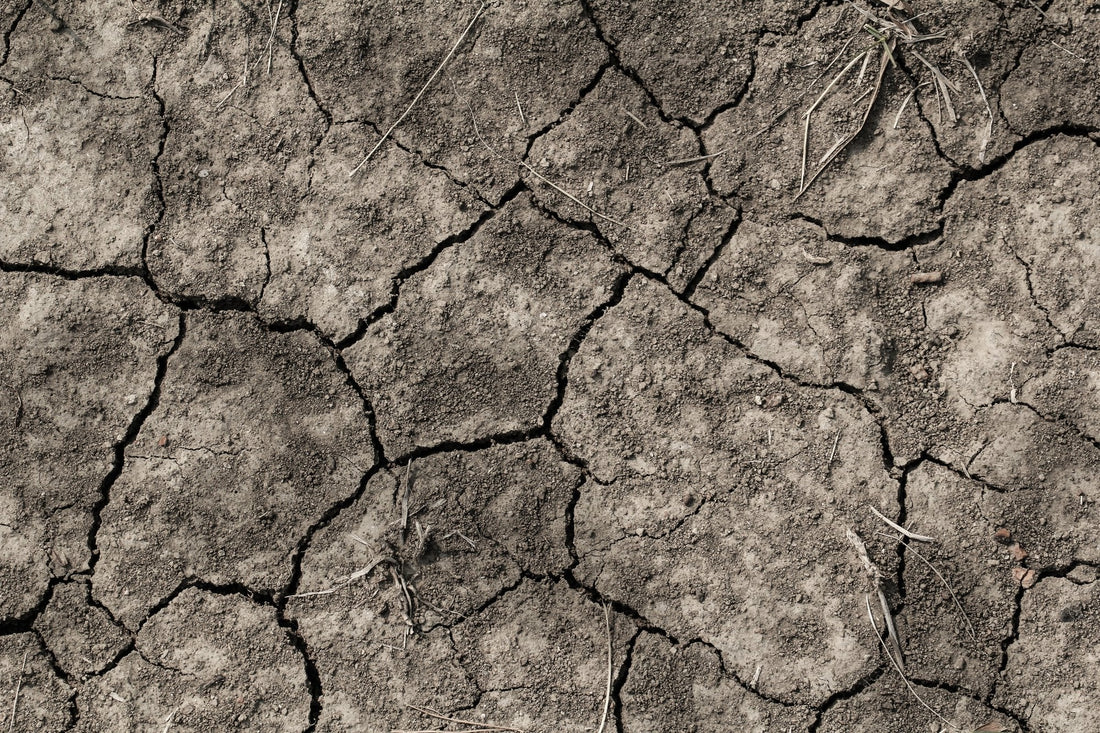
How to Tell If You’re Dehydrated & How to Prevent It In the First Place
Share
Dehydration can put you out of commission...fast. It can turn your body’s energy factories into defunct wastelands. It can bog-down your brain. It can sap you of energy.
Essential Takeaways:
- Initial symptoms of dehydration are hard to spot. For those that are chronically dehydrated, feeling off may just feel normal.
- Start Squeezing today to reclaim your hydration superpowers!
- Producing energy? Forget about it. Expelling waste products? Not a chance. The bottom line is, dehydration can drag you down, chew you up and spit you out on a cellular level. This article covers everything you need to know about dehydration, including how to prevent it in the first place. Let’s jump in!
Without enough fluids and electrolytes, even your body’s most basic functions can be sidelined.
- What Is Dehydration?
- What Are Electrolytes?
- Electrolytes and Dehydration
- Dehydration Risk Factors
- How to Tell If You’re Dehydrated
- How Much Water Should You Drink?
- How to Prevent Dehydration
- Dehydration & Your Brain: The Hidden Impact
- The Best Way to Replenish Electrolytes
What Is Dehydration?
Dehydration isn’t just about feeling thirsty, it’s about your body missing the core ingredients it needs to function properly. It refers to the loss of bodily fluids, yes, but it also includes the critical depletion of electrolytes that help power your muscles, regulate your heartbeat, and support brain function. There are three primary types of dehydration, depending on which component your body has lost most:
-
Hypernatremic or hypertonic: when you lose mostly water
-
Hyponatremic or hypotonic: when you lose mostly electrolytes (especially sodium)
-
Isonatremic or isotonic: when both water and electrolytes are lost at similar rates
Even mild dehydration - just a 2% drop in fluids - can cause symptoms like mental fatigue or sluggishness. Most people are walking around mildly dehydrated without realising it, which can lead to long-term effects on focus, digestion, mood, and energy. That’s why recognising and responding to the earliest signs is so important.
How Does Dehydration Happen?
Dehydration can happen for a few different reasons, including:
- Hot temperatures
- Consuming diuretics like coffee and certain medications
- Intense exercise
- Eating a poor diet that’s high in sodium
- Becoming sick, especially vomiting and diarrhea
- Excessive sweating
In a nutshell, anytime you increase sweat and urination, you’re more likely to become dehydrated.
What Are Electrolytes?
Electrolytes are minerals that conduct electricity in the body. The most important electrolytes are:
- Sodium
- Magnesium
- Potassium
- Chloride
- Calcium
- Bicarbonate
Out of these, sodium, potassium, and chloride are the most essential (1). They work together in the body and must be present in the right ratios. If they become imbalanced, it can lead to several symptoms of dehydration.
Electrolytes and Dehydration
Electrolytes are used to control the muscles, synthesize cellular energy (ATP), stabilize blood chemistry, support the organs, and of course balance fluids. Dehydration that involves electrolyte imbalances can disrupt the essential functions of the organs and cells. Your body requires specific levels of electrolytes to carry electrical signals and balance pH (the ratio of acidity to alkalinity). Some parts of the body, like the heart and brain, rely more heavily on electrolytes. For example, a healthy heart depends on electrolytes (2).
On a similar note, electrolyte imbalances can lead to dehydration headaches, brain fog, and more. Plus, the brain is 85 percent water, so if you’re low on fluids too, the side effects can increase exponentially. Fortunately, both electrolytes and water are found in fruits and veggies, like spinach and bananas. At the same time, all-natural sea salt and Himalayan pink salt contain a diverse profile of minerals.
Here’s a quick overview of how the different electrolytes affect dehydration:
Chloride
Chloride is a negatively-charged ion found in the blood. Its main job is to balance other fluids in the body. A significant change in chloride levels can lead to serious side effects, including death.
Magnesium
Magnesium is an essential mineral that’s needed for proper heart rhythms, nerve function, muscle contractions, bone strength, digestion, stabilizing the protein-fluid balance, reducing anxiety, and promoting sleep. Magnesium deficiency can lead to a variety of physical and mental health issues.
Sodium
Sodium is a positive ion that functions outside of the cells. Too much sodium is a common problem for people who eat a typical western diet because it includes too many processed foods.
Potassium
Potassium is a positive ion found inside the cells. It’s important for muscle function and regulating heartbeat. Significant changes in potassium levels can affect blood pressure and heart rhythm. Most people are low in potassium because they eat too much sodium, and these two minerals work closely together.
Bicarbonate
Bicarbonate acts as a buffer and helps maintain a healthy pH. Overly acidic body chemistry can contribute to inflammation and digestive issues.
Your hormones have a major impact on electrolyte levels as well... Electrolytes are secreted by the adrenal glands and kidneys, which are controlled by hormones like aldosterone, angiotensin, renin, and antidiuretic hormones. This makes it even more important to keep your hormones balanced with proper diet and exercise.
Dehydration Risk Factors
Who is most at risk for dehydration? Many elderly people experience serious health problems due to dehydration, especially when they’re sick or in the heat of summertime. During summer, dehydration is one of the most common reasons for dehydration in the elderly. However, athletes, young children, people who work physical jobs, and those with GI issues are also at risk. Let’s take a closer look at the people who have the highest risk of dehydration:
Elderly People
Elderly people often don’t drink enough water or eat enough electrolyte-containing foods. Plus, many of them lose the ability to notice the even most common symptoms of dehydration like thirst.
Children
Children are at a much higher risk for dehydration. Infants are even worse because they lose fluids seven times faster than adults. To make matters worse, children tend to dislike drinking plain water.
Chronically Ill Patients
Chronically ill patients, especially if they’re vomiting or have diarrhea, lose fluids and electrolytes faster and are less likely to drink water (3).
People Recovering From Viruses or Surgeries
People recovering from viruses or surgeries might not drink as much water because they aren’t feeling well.
Endurance Athletes
Endurance athletes, or anyone who works out for hours at a time, lose significant amounts of fluid through sweat.
People Who Have Physically Active Jobs
People who have physically active jobs, like construction workers, farmers, miners, and firefighters, experience higher rates of dehydration.
Residents Living in Hot or Humid Climates
Residents living in hot or humid climates need to drink more water because of increased sweating.
Endocrine Disorders and Hormonal Imbalances
Endocrine disorders and hormonal imbalances can cause the kidneys to excrete more electrolytes.
Eating a Poor Diet
Eating a poor diet that’s low in minerals can contribute to chronic dehydration.
People with Digestive Issues
People with digestive issues, like irritable bowel syndrome (IBS), tend to have more issues with electrolyte imbalances (4).
Kidney Damage
Kidney damage can disrupt the body’s ability to regulate chloride in the blood and trigger deficiencies in sodium, magnesium, and potassium.
How to Tell If You’re Dehydrated
Feeling thirsty is your body’s first SOS signal - but by the time it kicks in, dehydration has often already set in. That’s why early detection matters. Some of the most common and overlooked signs of dehydration include:
-
Brain fog and poor concentration
-
Tight jaw or neck stiffness
-
Low mood or irritability
-
Headaches that feel dull, throbbing, or persistent
-
Dry mouth, lips, and eyes
-
Reduced urination or darker-coloured urine
-
Digestive changes such as constipation or bloating
-
Dizziness or feeling lightheaded when standing up
People often mistake these signs for hunger, fatigue, or even illness. Chronic dehydration can mask itself so well that symptoms become part of your "normal" - which is why hydration should be proactive, not reactive.
How Much Water Should You Drink?
The truth is that it’s nearly impossible to put a number on how much water you should drink each day (6). However, the following guidelines can be used as a general rule of thumb:
- A good guideline is to drink enough water so that you urinate every four hours—anything less than this and you’re probably dehydrated.
- Your urine should never be dark yellow, but it shouldn’t be clear either—somewhere in between is just perfect.
- For most people, 8 to 10 glasses of water a day is ideal, but depending on the climate and how much you exercise this can vary.
- Women who are pregnant tend to need a little bit more: about 10-13 glasses a day.
- Teenagers and children who are growing fast should drink more too—so should anyone who’s taking antibiotics, hormonal pills, or other diuretics because they can cause you to lose fluids faster.
How to Prevent Dehydration
Prevention is always easier than recovery and when it comes to dehydration, a little planning goes a long way. Start with the basics:
-
Hydrate proactively. Don’t wait until you're parched. Sip fluids throughout the day, even if you don’t feel thirsty.
-
Balance your fluids. Pure water is important, but without electrolytes, your body struggles to retain and utilise it efficiently.
-
Eat your hydration. Many fruits and vegetables provide a dual benefit: water + minerals. Watermelon, cucumbers, and citrus fruits are great go-tos.
-
Watch for diuretics. Caffeine, alcohol, and high-sodium foods all increase fluid loss. If you consume them, increase your water and electrolyte intake to compensate.
-
Adapt to your environment. Humid climate? Sick with the flu? Running a marathon? Your hydration needs rise dramatically under physical or environmental stress.
And if plain water isn’t your thing, you’re not alone. That’s why Buoy exists—one quick squeeze into your favourite drink, and you’ve got a fast, clean hydration boost that actually helps your body absorb what it needs.
Eat More Hydrating Foods
Here are 10 of the most hydrating foods:
- Coconut milk
- Cucumber
- Watermelon
- Kiwi
- Celery
- Citrus fruits, especially grapefruit
- Carrots
- Pineapple
- Bell peppers
These foods are high in water content and electrolytes. Because of their balanced electrolyte profile, they also help to balance the overload of sodium that comes with eating too much canned, frozen, and processed foods.
Hydrate Before, During, and After Exercise
Exercise accelerates dehydration because it makes you sweat and burn more electrolytes. The best way to prevent dehydration is to hydrate early and sip electrolyte-enhanced water before, during, and after exercise. Drink a glass of water 15 minutes before your workout, and consume between 1.5 to 3 cups of water during your workout.
Consider the Weather
Drinking just 8 to 10 glasses of water a day may not be enough if you live in an area that’s really hot and humid. When you’re exposed to very hot temperatures, it’s important to drink even more. During hot months, make sure to dress appropriately—that means light clothing and plenty of sunscreen. Even if you aren’t physically active, you still need to plan for extra fluid loss. Remember, dehydration can seriously undermine your health. However, by following the guidelines in this article, you can stay on top of the hydration game and live your best life.
Dehydration & Your Brain: The Hidden Impact
When most people think of dehydration, they imagine dry lips or feeling thirsty after a workout. But one of the most serious side effects of dehydration actually shows up in your brain. Research shows that even mild dehydration can impair cognitive performance, short-term memory, mood regulation, and decision-making. That’s right, when you’re dehydrated, your brain literally slows down.
Why? Because your brain is about 75–85% water. Without enough fluids and electrolytes to support nerve signalling, your brain struggles to perform basic tasks. That’s why you might feel forgetful, irritable, foggy, or even anxious when you haven’t had enough to drink.
In fact, dehydration is a common trigger for:
-
Tension headaches and migraines
-
Mood swings and low motivation
-
Poor reaction time and reduced alertness
The next time you’re reaching for a coffee to wake you up, try a hydrating electrolyte drink instead. You might be surprised by how much more focused and energised you feel.
The Best Way to Replenish Electrolytes
The team at Buoy Hydration makes an incredibly convenient electrolyte boost that can be added to any drink. No longer are you limited to hydrating with only water - huzzah! Squeeze it into your tea, smoothies, protein shakes, organic juices, ANYTHING!
Don’t wait for an overly flavored tablet to dissolve in your water. Don’t spill environmentally unfriendly single servings packets of powder all over the place. Squeeze your Buoy today!
Keywords:
Dehydration treatment, Dehydration and blood pressure, Dehydration symptoms and signs, How to tell if you’re dehydrated, How to prevent dehydration, Types of dehydration, Symptoms of dehydration, Symptom of dehydration, Signs of dehydration, Common signs of dehydration, Common symptoms of dehydration, Early signs of dehydration, Prevent dehydration
References:
- http://chemistry.tutorvista.com/inorganic-chemistry/list-of-electrolytes.html
- https://pubmed.ncbi.nlm.nih.gov/29543505/
- https://www.ncbi.nlm.nih.gov/pmc/articles/PMC1385917/pdf/annsurg00384-0260.pdf
- https://pubmed.ncbi.nlm.nih.gov/15656483/
- https://www.ncbi.nlm.nih.gov/pmc/articles/PMC6603652/
- https://pubmed.ncbi.nlm.nih.gov/290921/





